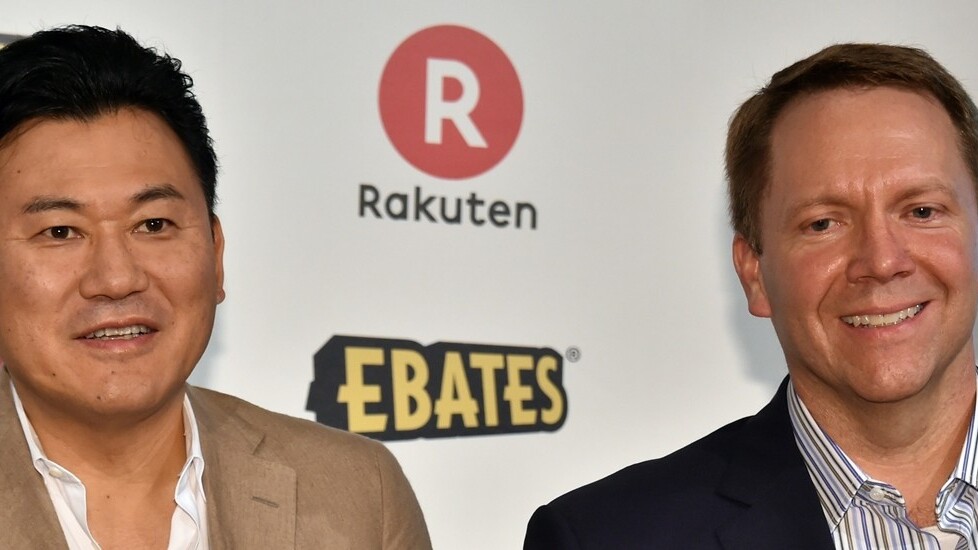
Rakuten announced the much-rumored acquisition of US e-commerce company Ebates, which operates a number of shopping sites, for $1 billion this week, but it is far from done with efforts to expand in North America.
The Japanese company has acquired smaller rivals in Western markets in the past — including Buy.com for $250 million in 2010, and Europe-based Play.com for $39 million in 2011 — and although its outlay on Ebates is far higher, it is one that the company actually sees as a bargain.
“A billion-dollar deal is very strategic and smart in this case,” Yaz Iida, executive VP of Rakuten USA and senior executive officer of Rakuten, told TNW in an interview. “Rakuten’s core offering is an e-commerce marketplace, we have a vision to create a next-generation marketplace and we believe that Ebates will provide the foundation.”
There are certainly similarities between the two companies. Both offer Amazon-like membership services to shoppers, who can enjoy perks and bonuses — in the case of Rakuten: points, in the case of Ebates: cash back — for their loyalty. Ebates says its members spent more than $2.2 billion in 2013, and the acquisition, which will close within a month, will boost Rakuten’s overseas presence.
“We’ve been expanding round the globe,” Iida said. “[Right now] just 6 percent of our GMV (revenue from merchants) is from outside of Japan, but that will jump to 16 percent with [the addition of] Ebates. Our goal is to reach 50 percent by 2020, and to do that we want to grow globally, especially in the US. The acquisition of Ebates will allow us to grow a lot faster.”
Not ruling out more acquisitions
But, despite laying out $1 billion on this deal, Rakuten is firmly in the market for more acquisitions.
“We’re not done yet,” Iida explained. “We will continue to look for assets to enhance what we have today, or correct missing pieces.”
Rakuten spent $900 million mobile messaging app Viber earlier this year, and Iida says that there’s no reason that the company might spend a similar figure on more acquisitions in order to augment its growth.
But don’t expect its new acquisition to remain as it is for too long.
“We will keep the Ebates brand in the short term [and there is] no timeline to integrate the backend yet,” Iida told TNW, hinting that a rebrand will come in the future — as was the case with Play.com and Buy.com.
While Rakuten’s interest was spurred by Ebates’ position in the US market, it also gives the Japanese firm new opportunities overseas since Ebates has business in Canada, China and Russia.
While he admitted that Rakuten has “always wanted to re-enter the Chinese market,” following a failed venture with Baidu, Iida reiterated that the company “wants to make sure that we succeed in the US,” and other market alliances with Ebates will be explored later.
Success overseas is no simple equation
One of the problem’s inherent to Rakuten’s thus far unrealized ambition to be big overseas is perhaps that the company is so successful in Japan, where it has long since branched into verticals like mobile payments, mobile data services, banking, gambling sites and even a baseball team.
In stark contrast it is just a foreign-sounding company in the US market, so giving Ebates a rebrand, as seems to be planned, might work against Rakuten, despite its plan to grow its ‘Super Points’ reward system in international markets.
Alibaba’s increasing interest in international markets may also be a concern, albeit that the Chinese firm is happy to ‘export China’ worldwide, for now, rather than play a truly global e-commerce game. Indeed, the threat of Alibaba was cited by Ebates CEO Kevin Johnson as a key reason why the company abandoned its IPO plans and sold to Rakuten instead.
It isn’t clear whether Alibaba can succeed in building a brand in the US, despite its colossal $160 billion valuation, but the Chinese firm seems happy to run experiments (like 11 Main) to gauge the state of the market from afar. Rakuten, however, is taking the acquisition approach and it will be interesting to compare the two as they both bid to extend their respective e-commerce empires into the lucrative US market and other parts of the globe.
Headline image via AFP / Getty Images
Get the TNW newsletter
Get the most important tech news in your inbox each week.






